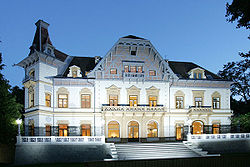
Political Academy of the Austrian People's Party
Encyclopedia

Austrian People's Party
The Austrian People's Party is a Christian democratic and conservative political party in Austria. A successor to the Christian Social Party of the late 19th and early 20th centuries, it is similar to the Christian Democratic Union of Germany in terms of ideology...
(Österreichische Volkspartei).
The “Political Academy” supports civic, political and cultural education through seminars, training courses, lectures, publications, applied research and much, much more. The PolAk is located in the "Springer Schlössl" (Springer Castle) in Vienna.
Development
On 9 July 1972, the Austrian National Assembly passed the “Federal Law on the Promotion of Civic Educational Activities in the Area of the Political Parties as well as Journalism”. This federal law determined that the government would promote the “civic educational activities of the political parties through allocation of funds to foundations or associations”. The Political Academy was founded in the same year. In 1975 the definitive training and administration centre was completed in the Springer Schlössl in the Viennese district of Meidling and handed over to the Political Academy. The Springer Schlössl had formerly been the site of the ÖVP’s Vogelsangheim.The Political Academy’s predecessor was named after Karl von Vogelsang, the Austrian social reformer and spiriual founder of the Christian Social Party (Austria).
At the same time, the other parties represented in the National Assembly founded their own political academies: The Social Democratic Party’s Dr. Karl Renner Institute and the Freedom Party’s Education Institute. The foundation of the Green’s Educational Workshop followed in 1987 and, in 2006, the BZÖ’s Austrian Future Academy.
Political Further Education
The political further education activities of the Political Academy of the ÖVP are in keeping with the stipulations determined in the currently valid “Law for the Support of Journalism” from 1984. These include that the activities of the Political Academy not be aimed at profit-making and that the Political Academy support civic education in the sense of the principles in the federal constitution. The core function of the Political Academy is political education for adults. These are fulfilled in two competence centres:The Cadre Training Unit is the Political Academy’s training and development centre. With its wide range of seminars, the Cadre Training Unit is the contact point for all those with Christian-Democratic values, and all politically interested citizens who wish to further their education. The courses and training programmes offered are especially adapted to the demands placed on political constituency-level work. The PolAk is particularly well-known for its first-class communication and rhetoric seminars.
In numerous events and publications, the Austrian Think-tank deals with socio-political matters, the further development of Christian-Democratic programmes and the implementation of political concepts in practice.
Important Recent Publications
Jahrbuch für Politik (Political Yearbook)The most important political, society, social, economic and cultural developments of the previous year are reviewed and analyzed in the “Jahrbuch für Politik” (ÖJP). The “Yearbook” is the standard work of political literature in Austria.
Schlüsselbegriffe der Demokratie (Key Concepts of Democracy)
This volume analyzes central concepts of the contemporary political debate such as social justice, small and medium sized businesses, property, education, the family, equality and many other matters of importance.
Stichwortgeberinnen (Ground Breakers)
These 14 portraits give an introduction to successful women in the fields of politics, the economy, science, the church and new social movements.
International Cooperation
The Political Academy participates in international cooperation with other foundations close to the ÖVP as well as other European think tanks and foundations such as the “Center for European Studies” (CES), the “European Ideas Network” (EIN) as well as the “European Network of Political Foundations” (ENoP).Directors of the Political Academy
- 1972 – 1974: Prof. Karl Pisa (Acting Director)
- 1974 – 1992: Ao. Univ.-Prof Dr. Andreas KholAndreas KholAndreas Khol is an Austrian politician of the center-conservative Austrian People's Party, President of the Nation Council from 2002 to 2006....
- 1992 – 1996: Mag. Dr. Bernhard Markus Löhri
- 1996 – 2006: Univ.-Prof. Dr. Günther Burkert-Dottolo
- 2007 – 2008: Mag. Peter Danich (Acting Director)
- Since 2008: Mag.Dr. Dietmar Halper
Presidents of the Political Academy
- 1972 – 1990: Dr. Alfred Maleta
- 1990 – 1996: Ambassador (retd.) Dipl.-Vw. Dr. Ludwig Steiner
- 1996 – 2004: Member of the National Assembly (retd.) President Dr. Heinrich Neisser
- Since 2004: Member of the National assembly (retd.) President Dr. Werner Fasslabend
External links
- Web site of the Political Academy of the ÖVP
- Politisches Jahrbuch
- Geradeausdenker (Thinking ahead) – Article on the Austrian political party academies in the DatumDatum (magazine)Datum is an Austrian monthly magazine.Founded in 2004 by journalist Klaus Stimeder and businessman Hannes Weyringer, Datum is published by the Association to Promote Quality Journalism eleven times a year. The circulation is 10.000 copies...
magazine

